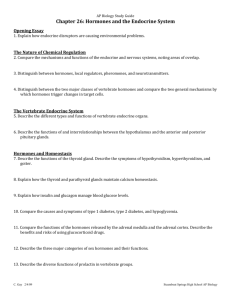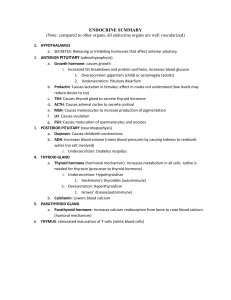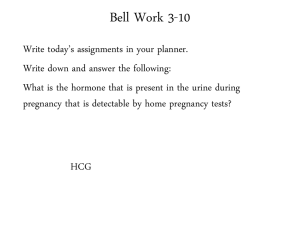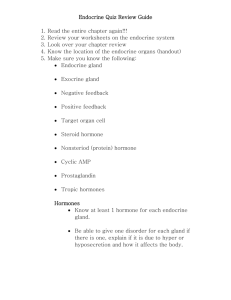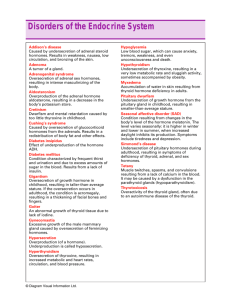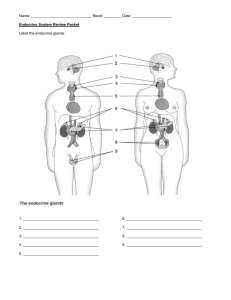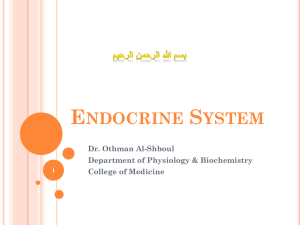Endocrine System
advertisement
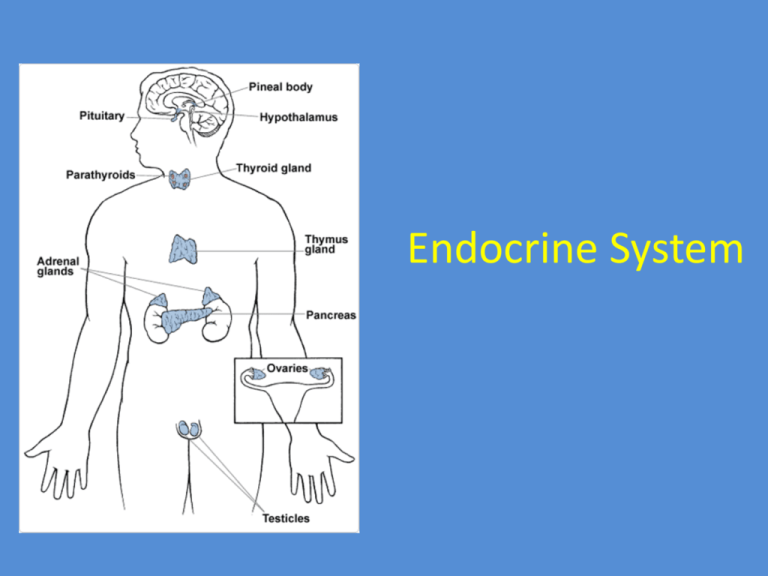
Endocrine System Endocrine System • Second great controlling system of body • Endocrine glands produce and secrete hormones • Hormones – chemical messengers that act on target cells to affect cellular metabolism • Three types: – Amino acid-based molecules – proteins, peptides – Steroids – made from cholesterol – Prostaglandins – lipid based Mechanism • Direct gene activation – steroids activates certain genes to synthesize new proteins • Second-messenger system – nonsteroid hormones use enzyme cascades to change cell response Control of Endocrine • Negative-feedback mechanism – hormone secretion triggered and then rising levels of hormone inhibit further hormone release Major Organs • • • • • • • • Pituitary Thyroid Parathyroid Adrenal Pineal Thymus Pancreas Gonads – Ovaries (F) – Testes (M) • Hypothalamus Pituitary Gland • Size of pea – hangs from hypothalamus • Two functional lobes – Anterior pituitary – Posterior pituitary • Often called “master gland” • However, controlled by hypothalamus Anterior Pituitary Hormones • Growth Hormone (GH) - Direct growth of skeletal muscles and long bones • Prolactin (PRL) - Stimulates milk production. Unknown function in men. Just joking - helps in formation of oligodendrocytes • Adrenocorticotropic hormone (ACTH) - Regulates adrenal cortex, stimulates production of cortisol, a “stress hormone” • Thyroid stimulating hormone (TSH) / Thyrotropic hormone (TH) – Influences thyroid hormone • Gonadotropic hormones – Follicle-stimulating hormone (FSH) - Stimulates follicle development in ovaries – Lutenizing hormones (LH) -Triggers ovulation of egg from ovary. In men, LH stimulates testosterone production Problems with the pituitary gland can result in Dwarfism Or a person can grow too much. These are pictures of the man known as “The Alton Giant”, Robert Wadlow. Posterior Pituitary Hormones • Oxytocin - Released during childbirth and in nursing women and healing of wounds – Stimulates contractions (positive feedback) – Causes milk ejection (let-down reflex) • Antidiuretic hormone (ADH) – Inhibits urine production – Causes kidneys to reabsorb more water Thyroid Gland • Located at base of throat, just inferior to Adam’s apple. • Produces thyroid hormone and calcitonin, which regulate body’s ability to break down food Thyroid Hormones • Thyroxine (T4) and Triiodothyronine (T3) – Control rate at which glucose is burned / converted to body heat and chemical energy – No iodine in diet no TSH being made, so no negative feedback growing thyroid = goiter – Iodine found only in seafood but added to salt = iodized salt • Calcitonin – lowers blood Ca2+ – Causes calcium to deposit in bones Hypothyroidism Before and After Treatment Treatment is thyroxine Cretinism (hypothyroidism in infants) Hyperthyroidism (Grave’s Disease) Removal of thyroid for treatment or thyroid-blocking drugs, also radioactive iodine – destroys some of thyroid cells Parathyroid glands • Small masses on thyroid gland. • Secrete parathyroid hormone (PTH) – Regulates Ca2+ ions – Stimulates osteoclasts to break down bone to release calcium Adrenal Glands • Superior to kidneys • Glandular tissue (cortex) and neural tissue (medulla) • Hormones – Corticosteroids – Mineralcorticoids (main=aldosterone) – regulate minerals in blood (salt) – Glucocorticoids (main=cortisone and cortisol) – promote metabolism, resist long-term stressors by increasing blood glucose levels – Sex hormones (main = androgens) – also makes estrogen Adrenal Gland Disorders • Cushing’s syndrome o o hypersecretion of cortisol Round “moon” face and “buffalo hump” • Addison’s disease o o o Hyposecretion of cortisol Low blood pressure results Increased pigmentation Pancreas • Located close to stomach in abdominal cavity • Structures called Islets of Langerhans secrete: • Insulin – Targets all body cells to increase glucose breakdown, reduce blood sugar • Glucagon – Regulates blood glucose levels by targeting liver to break down stored sugar, increase blood sugar Diabetes Mellitus • Results from insulin deficiency • Blood sugar rises (hyperglycemia) and excess is excreted in urine • Type I – insulin dependent. Caused by inherited disorder that destroys Islets • Type II – mature onset diabetes. Can be controlled with diet and exercise Pineal Gland • Small mysterious gland that hangs from brain • Secretes melatonin – Melatonin plays a role in maintaining circadian rhythms (sleep cycles) Thymus Gland • Located in upper thorax, posterior to sternum • Produces thymosin – Involved in development of white blood cells Gonads • Ovaries – female gonads. Paired. Located in pelvic cavity. Produce ova (eggs) • Produce estrogens and progesterone – Estrogen – sex characteristics in women – Progesterone – menstrual cycle • Testes – male gonads. Paired. Located in scrotum. Produce sperm • Produce androgens (main = testosterone). – Sex characteristics in men. Production of sperm The Lion, the watch, and the hormones



